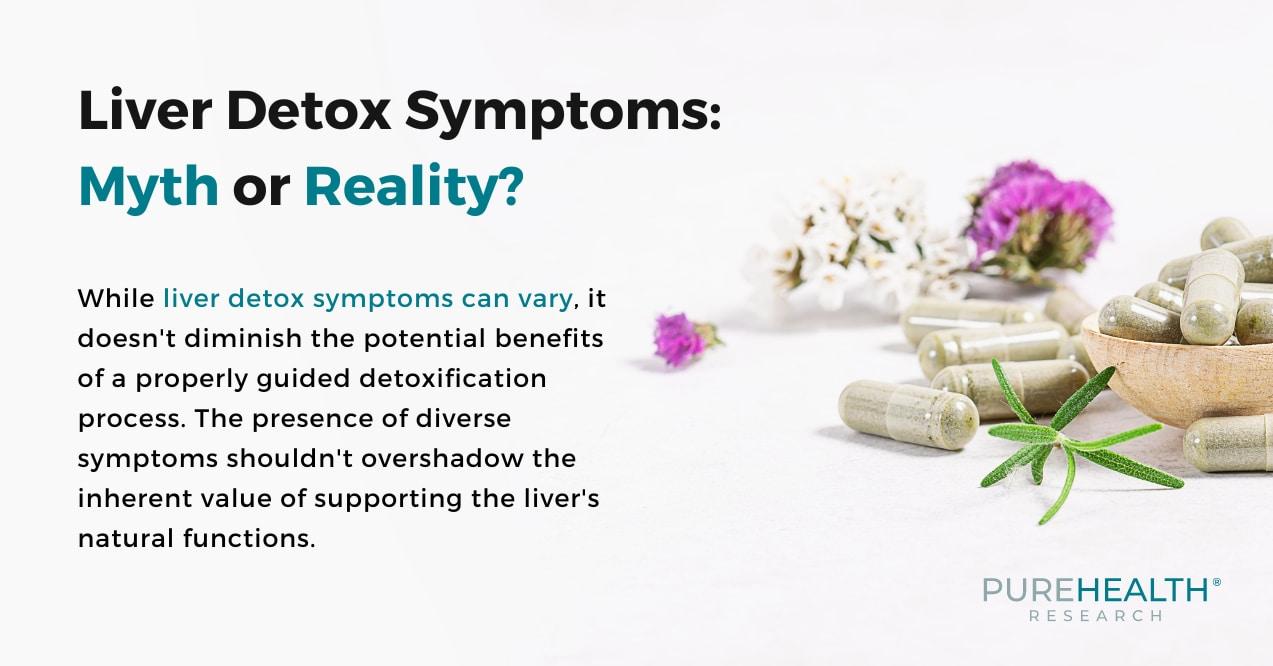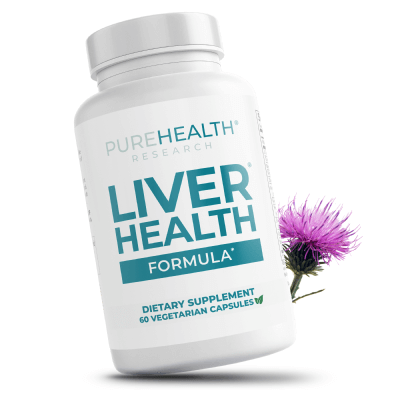Liver Detox Symptoms: Myth or Reality?
Are you looking to clean your liver or want to know more about liver detox symptoms? Look no further! Find out more about liver functions and how to detox.


In today’s evolving health sphere, the discussion surrounding liver detox symptoms is increasingly prevalent. As many strive for better health, they turn to detoxification measures, particularly concerning the liver, our body’s vital detoxifying powerhouse. As 2024 unfolds, the buzz around liver detox symptoms, including how long these symptoms last and their mental manifestations, has intensified, sparking crucial conversations among both health enthusiasts and medical professionals.
A liver detox typically involves adhering to specialized diets, consuming herbal supplements, or undergoing certain therapies meant to enhance the liver’s inherent detoxification abilities. Proponents of these methods promise a myriad of benefits, from elevated energy levels and a brighter complexion to improved digestion and weight loss.
What Do Liver Detox Symptoms Really Mean?
This article dives into the scientific basis underlying liver detoxification, distinguishing myths from facts to provide a thorough grasp of the phenomena. This write-up will outline the liver’s actual detoxification capacity and whether the symptoms associated with detox regimes truly represent an effective cleaning process. Join us on this informative trip as we discern the truth about liver detox symptoms to reveal a complete picture of our bodies’ incredible ability to sustain overall well-being.
Liver Detox Symptoms: Myth or Fact?

When people embark on a ‘liver detox’ regimen, they often report symptoms such as headaches, irritability, fatigue, mood swings, and digestive issues. These are typically attributed to the ‘toxins’ being released. But is this scientifically accurate?
- Non-specific Symptoms: Many reported liver detox symptoms are non-specific and can be related to a variety of causes. For example, when a person drastically changes their diet, it might lead to symptoms like fatigue and digestive issues, not necessarily because of toxin release, but due to abrupt dietary changes that the body is not accustomed to.
- Toxins: The term ‘toxins’ is broadly and ambiguously used in the wellness industry. There’s often little specification about which toxins are supposedly being released, making it difficult to assess the validity of such claims.
- The Adaptive Body: If our bodies truly stored harmful levels of toxins, we’d likely be in a state of constant illness. The liver, kidneys, and other organs are adept at managing and excreting wastes without the need for special detox regimens.
- Dietary Restrictions and Nutrient Deficiencies: Many liver detox programs involve dietary restrictions, which can result in nutrient deficiencies, leading to the aforementioned symptoms. For instance, a decrease in carbohydrate intake can result in headaches and fatigue, not due to toxins but because of reduced glucose, the brain’s primary fuel.
While the symptoms associated with liver detox can be a mixed bag and sometimes hard to interpret, this shouldn’t overshadow the potential benefits of liver detox. It’s crucial to recognize that, when done correctly and under proper guidance, a liver detox can offer several health advantages, enhancing the liver’s natural ability to process and eliminate toxins from the body. The presence of varying symptoms does not negate the intrinsic value of a liver detox, and it remains an option worth considering for those seeking to optimize their overall well-being.
5 Signs Your Liver Needs a Detox
When your liver needs assistance, it may exhibit warning signs in the form of numerous symptoms. Let’s delve into some of the most common indications and symptoms that may indicate your liver requires a detox.
1. Suddenly Becoming Overweight
If you notice unexplained weight gain or trouble reducing weight despite following a balanced diet and exercise program, this could be an indication of a stressed liver. A malfunctioning liver may fail to efficiently process lipids, resulting in weight management issues.
2. Nausea After Eating
Frequent symptoms of nausea or pain after meals may indicate a problem with liver function. The liver produces bile to aid in fat digestion. When the liver is not working correctly, the impact on the bile secretions results in digestive difficulties.
3. Tiredness and Fatigue
Liver dysfunction may cause chronic weariness and a lack of energy. The liver is in charge of turning nutrients into energy and eliminating pollutants. When the liver is overworked or not functioning properly, it can cause fatigue and lethargy.
4. Emerging Allergies and Sensitivity
A sick liver may not be able to filter toxins and allergens properly, leading to a rise in allergic reactions or sensitivities. These symptoms can manifest as skin rashes, hives, or respiratory difficulties in response to particular meals or environmental variables.
5. Increased Exposure to Toxins
Exposure to more toxins than usual, such as alcohol, pollution, or some drugs, might overwhelm the liver’s detoxification potential. Such instances will also reduce the body’s antioxidant capacity, promote inflammation, lead to brain fog, trigger the symptoms mentioned above and indicate that the liver requires assistance.
The previously mentioned liver detox symptoms help you realize when it’s time to address liver health and investigate detoxification options. It is important to remember that even though these symptoms may indicate a strained liver, they are not conclusive evidence of liver malfunction. If you develop any of these symptoms, you should see a doctor immediately for an accurate evaluation and diagnosis.
Furthermore, the concept of a “liver detox” in connection with popular diets and cleansing programs should be taken cautiously and may be dangerous. Always follow a safe liver detox method recommended by a reliable source backed by scientific evidence, or consult your healthcare professional, particularly if you have a medical condition or are taking medications. Prioritizing nutritious food, staying hydrated, and living a healthy lifestyle can all help to support liver health naturally.
What Is a Dysfunctional Liver?
When the liver isn’t operating at its peak, it can lead to numerous health concerns. As a cornerstone of our well-being, the liver is entrusted with tasks like detoxification, metabolizing nutrients, synthesizing vital proteins, and regulating hormones. Key functions include:
- Metabolism: Efficiently converting carbohydrates, fats, and proteins into energy or storing them for future needs.
- Detoxification: Vigorously processing and eliminating harmful substances, such as drugs, alcohol, and environmental pollutants, preventing their accumulation.
- Synthesis: Producing crucial proteins like clotting factors and albumin, indispensable for various bodily functions.
- Storage: Storing essential minerals, vitamins, and glucose for subsequent cellular use.
Several circumstances can cause liver dysfunction, and the degree of seriousness of the problem can vary greatly. The following are some of the most common causes of liver dysfunction:
- Increased Toxic Load: Exposure to heavy metals, high environmental pollutants, long-term personal care chemicals, processed foods, artificial sweeteners, hormone and antibiotic-laden protein (meat, fish, poultry), bisphenol A plastics (BPAs), high-heat cooking derived advanced glycation end products (AGEs) and polyaromatic hydrocarbons (PAHs), per-and poly-fluoroalkyl substances (PFAS), and stress can burden liver functions.
- Liver Diseases: Conditions like inflammatory pathogens, fatty liver deposits, scarring, and liver malignancies can impede the liver’s optimal performance.
- Alcohol Misuse: Prolonged excessive alcohol consumption can lead to alcoholic liver dysfunction and deteriorating liver cells.
- Drug-Induced Liver Injury: Certain drugs, herbal supplements, or pollutants might cause liver damage, resulting in impaired function,
- Infections: Pathogens, heavy metals, and toxic load can compromise liver health.
- Autoimmune Disorders: Diseases where the body’s defense system erroneously targets liver cells with autoimmune responses or primary biliary scarring can instigate inflammation and malfunction.
Symptoms of a dysfunctional liver might manifest as fatigue, jaundice, swelling in specific body parts, abdominal discomfort, a tendency for easy bruising or bleeding, and significant appetite and weight fluctuations. It may also contribute to nerve damage and bone loss, disrupting cognitive functions and mood. Addressing liver disorders demands timely diagnosis and apt intervention.
Lifestyle modifications, drugs, and treatments that target the root cause can assist in improving liver function as well as avoid future damage in some circumstances. In extreme situations, individuals may require a liver transplant to restore normal liver function. Regular check-ups, a nutritious diet, moderate alcohol intake, and avoidance of liver-damaging chemicals can all help to preserve liver health.
How Long Do Liver Detox Symptoms Last?
The time frame for liver detox symptoms can differ significantly depending on individual factors, the extent of liver damage, and the detox methods implemented. It’s imperative to differentiate between symptoms that arise during acute detox phases and those that stem from chronic liver dysfunction. Equally important is an awareness of the mental symptoms of liver detox.
Short-term symptoms often surface during intensive detox regimens. These can encompass headaches, fatigue, nausea, digestive disruptions, and sensations resembling the flu. Often termed the “detox reaction,” this phase can span a few days to several weeks. During this time, the body adjusts to the detox process, expelling accumulated toxins. Ideally, these reactions should be transient and mild.
However, when there’s prolonged liver damage, detox symptoms might persist or even intensify. In conditions like cirrhosis or chronic hepatitis, signs such as jaundice, chronic fatigue, and swelling can linger unless the root liver issue is adequately identified and addressed.
Approaching liver detoxification cautiously is paramount. Avoiding overly aggressive or unverified detox treatments is advisable. A gradual, balanced detox method is typically more sustainable and lessens the risk of severe reactions. If you have existing liver conditions or other health concerns, it’s crucial to seek professional counsel.
Remember, our liver is robust and resilient. By embracing a healthy lifestyle — complete with a balanced diet, regular exercise, and moderation in alcohol and toxin exposure — you can bolster its innate detox capabilities. Should you have apprehensions about your liver’s state or the detox process, always turn to a seasoned healthcare professional for a precise evaluation and tailored guidance.
How Long Does It Take To Detox Your Liver From Alcohol?
The time that it takes to detoxify the liver from alcohol varies depending on various factors, including the amount and length of alcohol use, individual wellness, and the existence of any underlying liver problems. Although the liver is efficient at digesting alcohol, excessive and continuous alcohol intake can overwhelm its detoxifying ability, resulting in liver damage and dysfunction.
A person with moderate alcohol usage and a healthy liver can metabolize one standard drink (equal to around 14 grams of pure alcohol) in one to two hours. It could be detected in the bloodstream for several hours and in the urine for several days. However, if a person consumes high amounts of alcohol on a regular basis, the liver may take longer to process and eliminate the alcohol from the body.
Chronic alcohol misuse can compromise the liver’s detoxification function over time, resulting in fat accumulation and inflammation in the organ’s cells, a medical disorder known as alcoholic fatty liver disease. If alcohol usage persists, it can lead to more severe alcoholic liver disorders, which severely hamper the liver’s capacity to function.
Alcohol detoxification of the liver is a gradual process. When a person stops drinking, their liver can begin to recover and mend over time. Liver detox symptoms from alcohol might also appear during this process, but they should be manageable with the right approach.
Improvements in liver health might be seen in mild cases within weeks to months. However, for more serious liver disease, regeneration and restoration of the liver may take many months to years to restore its complete functions.
How Do You Know if Your Liver Is Detoxing Successfully?
To determine whether your liver is detoxing appropriately, you must monitor specific signs and symptoms, perform liver function tests, and maintain a healthy lifestyle. The liver is a tough organ with a natural ability to renew and purify itself, but it requires sufficient assistance to function correctly. Here’s how you can know your liver is detoxifying successfully:
- Symptom Improvement: Successful liver detoxification can appear as higher energy, improved digestion, mental clarity, clearer skin, and reduced weariness. If you have previously experienced nausea, bloating, or unexplained weight gain, these symptoms may lessen as the liver becomes more effective at processing toxins.
- Balanced Liver Function Tests: Liver function tests, which include alanine transaminase (ALT), aspartate aminotransferase (AST), and gamma-glutamyl transferase (GGT) values, provide vital information about liver health. These enzyme levels should return to normal or improve as the liver detoxifies, showing decreased inflammation and impairment.
- Bilirubin Normalization: The liver produces bilirubin as a byproduct when it breaks down red blood cells. High bilirubin levels may indicate liver dysfunction. A good detox may result in bilirubin levels returning to normal.
- Reduction in Liver Fat Content: If fatty liver disease is caused by excessive alcohol or bad dietary habits, a successful detox should reduce liver fat content. Imaging tools such as ultrasonography and FibroScan can aid in assessing changes in liver fat buildup.
- Allergy and Sensitivity Symptoms Relief: A properly detoxifying liver may result in fewer allergy responses and sensitivities. The immune system is less prone to react negatively to allergens as the liver restores its proficiency for breaking down toxins.
- Stable Blood Sugar Levels: A properly detoxifying liver can help manage the sugar in the blood more effectively, enhancing cellular glucose sensitivity and energy metabolism.
- Changes in Lifestyle: Favorable lifestyle modifications frequently accompany a successful liver detox. Adopting a balanced diet, minimizing alcohol use, avoiding processed foods, and indulging in regular exercise are all things that can help your liver.
Understanding that the liver detoxification process is progressive and personalized is essential. The severity of liver malfunction and a person’s dedication to healthy lifestyle modifications all influence the outcome. Furthermore, avoid harsh detox methods that lack scientific evidence because they may cause more harm than good. A more effective and safer approach to long-term liver health is to support the organ through sustained lifestyle modifications.
Liver Health Formula Supplements for Liver Detox
You are in luck because PureHealth Research has supplements for cleanse and detox, that can help with liver detoxification. One is Liver Health Formula, a supplement you can rely on to support healthy liver functions. The evidence-backed ingredients contain bioactive compounds that target the mechanisms that optimize detoxification enzymes, digestion, fat-burning, weight management, and energy production to boost your endurance throughout your day. Some of the ingredients include:
- Turmeric
- Bioperine
- Beet
- Dandelion
- Silymarin (from milk thistle)
- Artichoke extract
- Ginger
- Alfalfa
- L-Cysteine
- Glycine
- Vitamin D3
Rich phytonutrients stimulate antioxidant production, reduce organ-damaging oxidative stress, promote cellular repair and regeneration, help break down fatty deposits, and support healthy immune responses. We recommend consulting with your doctor before taking the Liver Health Formula supplement, even though there are no known side effects. To see our best supplements for cleanse and detox, click here.
The Liver Health Formula, recommended by Dr. Holly Lucille, ND, contains superior-quality natural nutrients that help optimize the liver functions, which supports its 500+ tasks. For adults, taking two capsules a day should do, and to get the best results, drink with 6-8fl oz of water. Do not exceed the recommended amount. Pregnant or nursing women, children under 18, and people with a known medical condition should check with their doctor before using this supplement.
Final Thoughts
In conclusion, we have dwelt on the complexities of liver detoxification and its accompanying symptoms. While the liver is a marvelous organ with natural cleaning capabilities, the notion of quick-fix detoxes and the advantages they offer need careful consideration and approach.
The signs and symptoms frequently associated with liver detoxification may not always reflect the liver’s true status. Instead, an improved knowledge of liver health and its requirements is necessary. Prioritizing a healthy lifestyle directed by healthcare specialists and informed by scientific facts is vital in promoting the liver’s intrinsic detoxifying powers in the pursuit of overall well-being.
Embracing healthy lifestyle choices and appreciating the liver’s resilience is the key to promoting long-term health and vitality.
The idea of “toxin release” during detox is often oversimplified. While the liver does filter waste products, the reported symptoms may be due to dietary changes or other factors.
Signs like unexplained weight gain, nausea after eating, fatigue, and increased allergies could indicate a stressed liver. It’s best to consult a doctor for proper evaluation.
The duration varies. Short-term symptoms during a detox program may last a few days to weeks. Chronic liver issues may cause persistent symptoms requiring medical attention.
Some supplements like Liver Health Formula may support liver function, but consult your doctor before starting any new supplement.
Sign up for our Healthy Living newsletter!
Advertisement. This site offers health, wellness, fitness and nutritional information and is designed for educational purposes only. You should not rely on this information as a substitute for, nor does it replace, professional medical advice, diagnosis, or treatment. If you have any concerns or questions about your health, you should always consult with a physician or other health-care professional. Do not disregard, avoid or delay obtaining medical or health related advice from your health-care professional because of something you may have read on this site. The use of any information provided on this site is solely at your own risk.











